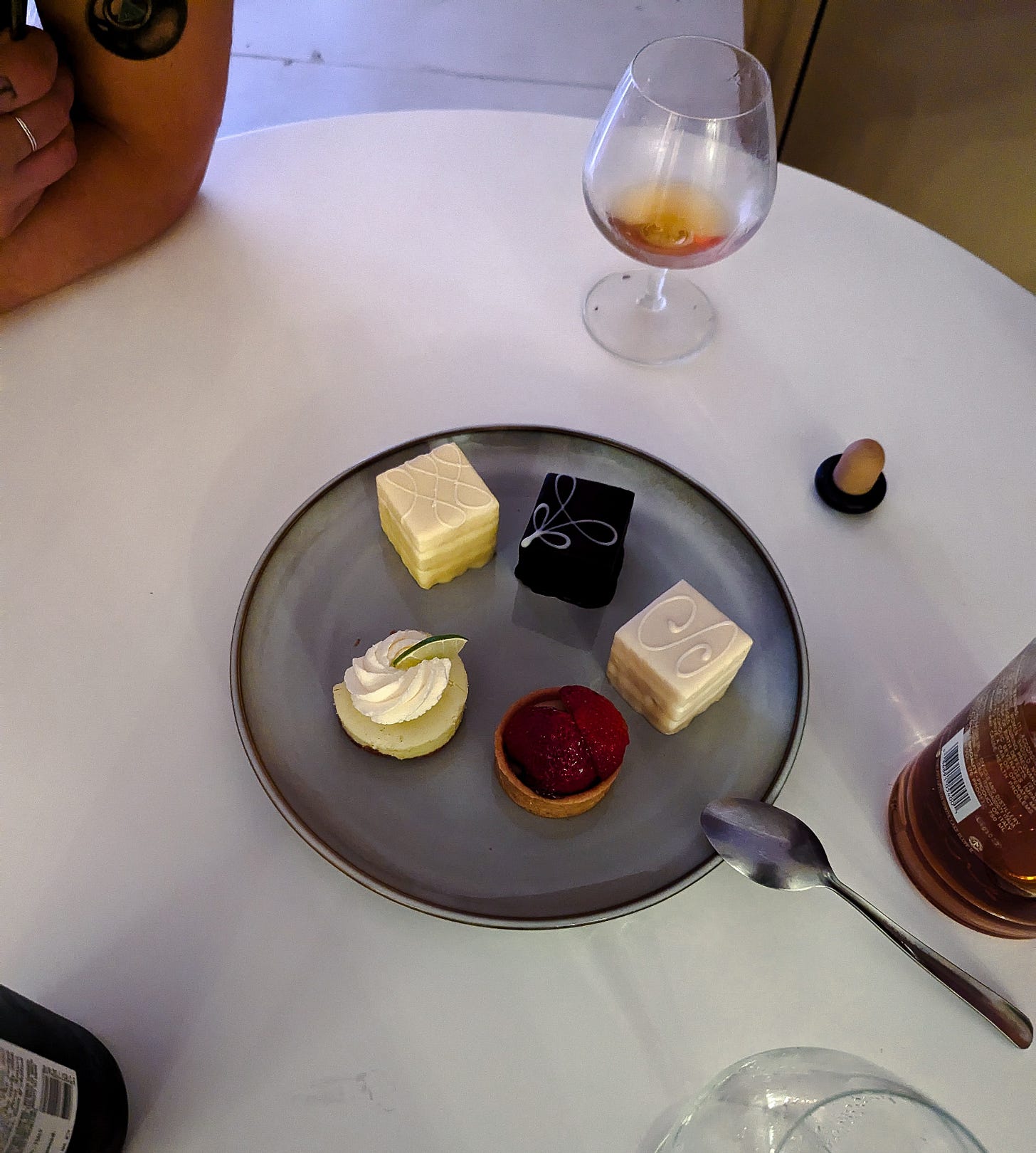New York City Cooks Touch Everything on the Table, but Your Tip - No. 20
And what defines intimacy in the kitchen.
Welcome to Vegarie! A newsletter full of stories and interviews with women in food. Today, I’m starting a small series that addresses current events in the restaurant industry. Am I taking note of the boomboxes playing “In Your Eyes,” outside my window as a sign that you miss my perspective? Possibly...Or do I just have some personal stories saved up? Either way, this week is a discussion on tipping laws in New York City. Did you know that regardless of the intimacy cooks share with your food—and by extension, with you—anytime you dine in, that we never touch your tip? I know, the wording here sounds a lil naughty. But get your head out of the gutter and read more, ok? This is important.
If you haven’t already, please subscribe (while it’s still free!) and you'll receive my biweekly newsletter on Tuesdays.
“Four minutes!” our service manager calls out. Ice crashes into a wine tub, forks are straightened, and chef is cleaning up tasters of tonight’s menu. Garlic is wafting through the air and Sarah is singing again— on the line next to me—to some rendition of Golden Years. I’m mincing parsley. I’m anxiously glancing out the window at guests who are lining up. Nerves are pouring to the brim of a theoretical coup for the moment that I’ve spent hours preparing for. The moment when we hear the soft click of the latch and opening of the door, signaling the start of service. I’m a cook in an open kitchen and I'm barely visible the moment bubbly hits the glass, but I’m about to be the most intimate participant of the guests’ dining experience.
Maybe as they enter, they’ll notice my hands moving furiously on the other side of the room. Maybe as they leave, I’ll have a moment to glance up and meet their compliments with a smile. But delicious as these hands have made their lamb taste, here in New York, these hands won't touch a penny of the tip. Tipping policies have been in flux as restaurants reopened after years of pandemic closures. The suggested gratuity on any given meal—prefix, multi-course, or even an espresso to-go ranges between 20-25% these days. I’m sure this increase has led many to read articles about restaurants reworking their tipping policies and draw false conclusions that this signals an increase in pay equity within the industry. Sure, dish prices are beginning to rise for tip-free restaurants, and yes, certain establishments have elected to include auto-gratuities, but what these increases don’t address are the workers who get to participate in the tip pool.
In New York City, a law still exists that prohibits businesses from accepting and distributing tips to the hands of laborers who aren’t directly customer-facing, creating a large pay disparity between front and back-of-house workers. I'm speaking about Labor Law Section 196-d. Originally, this law was created to protect workers. And to be fair, it does. Which I’m sure, is why it remains still— Section 196-d prohibits employers from demanding, accepting, or retaining, any part of an employee's gratuity. And while this protection is certainly important, there’s a flaw in the wording. The same law also states that "any charge made to the customer in addition to charges for food, drink, lodging, and other specified materials or services, is presumed to be a tip, and must be given to the employee who provides customer service." Therefore, this law not only protects the tip from the hands of the employer but also from any support staff who are not in direct contact with a customer.
The inequity is quite familiar in the service industry. In one single night, a server can make 4-5 times that of a cook from their tips alone. And slammed or not, cooks make the same hourly wage, often just a hair above the minimum— which is pennies in a city like New York. I’m not here to argue who does more or less to create an experience for the diner. We need the server. For most who chose the kitchen, we did so because we’re not so great with social interaction. A server is table-side all night. They make you laugh, they top your glass with Prosecco, and join in on the cheers of your accomplishments. I may not be by the diner’s side, but as a cook, I show my love for the guest through the careful way I prepare their plate. You see, as they arrive, I warm it. Nothing is worse than a cold plate and a warm entre. In the hot throws of a busy service, I season and taste each entree—multiple times. I never want to serve you anything cold, anything that could make you sick, and I certainly don't want to serve you a rock instead of a clam. I check the lamb for doneness; holding a hot cake tester to my lip, like a mother checking a warm bottle of milk on her wrist before serving it to her baby. I touch your chicken with my hands while it's on the grill because we were taught to feel for its tenderness, not its temp—if done right, giving you a chicken so soft it’s almost buttery. Sometimes I even cry over the food, the pressure of the timing, or the pride of finally getting the dish just right. I don't know you, but I've been very intimate with your food. And I believe you can taste that intimacy in every bite.
So I must ask, how is it that cooks still operate under such out-of-date policies? How do we slip by making 4-5 times less than our teammates on a technicality? The solution may be to end tipping altogether. Or possibly, it’s to change the wording of Section 196-d—to include the kitchen which plays just as intimate a role in your meal. I’m no law-maker, and I’m certainly not the only one discussing these important topics. I’m just a New York City cook, and I touch everything on your table but your tip...and I should touch the tip too!






"The solution may be to end tipping altogether. Or possibly, it’s to change the wording of Section 196-d—to include the kitchen which plays just as intimate a role in your meal."
I prefer the former (eliminate tipping), if food service operations actually pay employees what they are worth, but we seem to be moving in the opposite direction. The latter idea — including the kitchen in tip distribution — may make sense, but only if the employees currently classified as "tipped" and those (like cooks) classified as "untipped" start at the same baseline. The distinction in the lower minimum wage for tipped employees is an important part of this story.